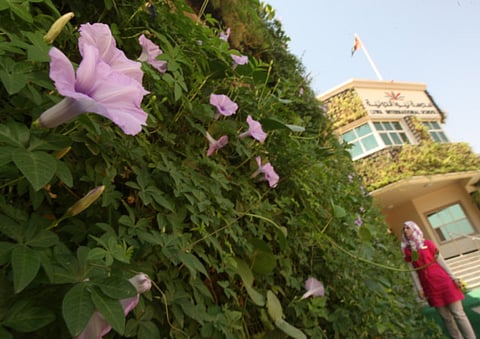Green revolution at Abu Dhabi schools
Government’s sustainability initiative helps schools in the UAE capital conserve water and electricity

Abu Dhabi Schools in the capital are taking steps to conserve water and electricity thanks to a government initiative.
The Sustainable Schools Initiative (SSI) programme, initiated by the Environment Agency Abu Dhabi (EAD) which encourages students to preserve the environment, is already yielding tangible results.
The Abu Dhabi Indian School (ADIS) alone saves 49,000 litres of water daily.
“As part of the SSI, we had to take concrete steps to reduce our water and energy consumption. We decided to install a low-cost gadget called Super Flow in flush tanks which helps save 10,000 litres of water everyday. We have also adjusted the valve inside the tanks to control the volume of water being used. This helped save an additional 39,000 litres of water a day,” said Karan Singh, headmaster for senior boys at the Abu Dhabi Indian School.
“We plan to switch to LED lights which will further reduce energy consumption,” he added.
At Al Bashair School in Mussafah plastic usage has dropped by 92 per cent in just one year. “Earlier, we used 1,000 plastic cups a day. But not any more,” said school teacher Shwikar Al Kaff.
As many as 131 schools are registered with EAD. “Registration is not mandatory, but seeing its benefits, more are more schools are signing up for our environmental programme,” said Gayatri Raghwa, senior specialist outreach, Environment Agency Abu Dhabi (EAD).
Big benefits
Since the launch of the SSI programme five years ago, schools have managed to reduce their per capita waste by 23 per cent and water consumption by 54 per cent.
The Liwa International School in Al Ain has even invested Dh1.2 million for 102 solar panels in their compound. “We undertook this project to meet SSI guidelines. The solar panels generate 28,470 kilowatts of power annually. They power 250 outdoor lights and two water purifiers that recycle grey water,” said Rima Daouk, head of quality assurance and public relations.
“We have planted thousands of plants around the school to help cool the environment and reduce our dependency on air conditioning,” she added.
EAD said a medical recycling initiative by students of Qatr Al Nada school in Madinat Zayed resulted in the safe and convenient disposal of 5,745kg of pharmaceutical waste. “It all started when students from the school’s eco-club expressed concerns about the disposal of expired medicines. They can be toxic when thrown into the common waste stream as they can harm the environment, particularly animals who feed on the waste. As part of the SSI commitment, the school approached the Health Authority in Abu Dhabi to extend their outreach in the western region of Abu Dhabi,” said Rasha Ali Al Madfai, manager of environmentally sustainable schools.
Room for medicines
“The students used a room in the school to store unwanted medicines and created small cubicles to separate them according to their chemical composition.”
Students also had a solution for pigeon droppings around the area.
“The school set up pigeon holes on its terrace where the birds would come to feed. Their droppings were used to make fertiliser.”
EAD has encapsulated some of these stories in a book titled AHA Moments which captures the inspirational moments of the schools on their journey towards sustainability.
You speak:
What should we do to preserve the environment?
Write to us at:
news@xpress4me.com
sms 5101



